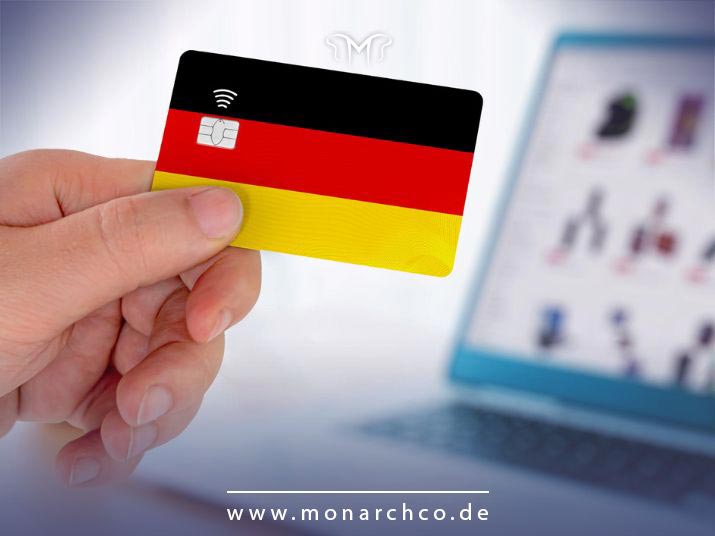
Opening a Bank Account in Germany
Opening a bank account in Germany is one of the most important steps to take upon entering the country. Given the differences in banking systems and regulations across countries, we've decided to explore everything you need to know about opening a bank account in Germany in this article.
Non-German individuals living in Germany have the opportunity to open an account with one of the country's banks. Opening a bank account in Germany is straightforward for EU citizens, while citizens of other countries require authorization, and their financial history needs to be reviewed for this purpose. It's worth mentioning that opening a bank account in Germany is possible even before migration, and it can be done through online or mobile German banks (Direktbanks), or by opening an account for non-residents. Major international banks like HSBC and Citibank also have branches in Germany, offering necessary steps for opening a bank account.
Keep in mind that choosing and partnering with a reputable immigration agency can assist you in the process of opening a bank account in Germany. At Monarch Immigration, for instance, we provide all necessary guidance for opening a bank account in Germany and living in the country. In the following sections of this article, we will delve into more information regarding types of bank accounts, requirements for opening a bank account in Germany, including costs, procedures, and necessary documents, so stay tuned until the end of this piece.
Choosing Banking Services When Opening an Account in Germany
Banking services offered by German banks are diverse and include various options such as mortgage loans, insurance policies including vehicle, home, and health insurance, retirement plans, as well as diverse investment options. The different types of loans and investment choices greatly assist in covering living expenses in Germany, making them highly practical for account holders to offset living costs, start a business, purchase a home, and more.
Stages of Opening a Bank Account in Germany
The process of opening a bank account in Germany appears to differ from other European Union countries. Therefore, it may be challenging for individuals who have recently immigrated to this country and are unfamiliar with the banking laws and procedures in Germany. Opening a bank account in Germany can be done either online or through in-person visits. The steps involved in opening an account through each method vary.
Generally, the steps for requesting an account online in Germany include:
1. Finding the current account registration form ("Girokonto") on the bank's website.
2. Printing out the form and completing the required information.
3. Presenting the completed form along with a proof of identity form ("PostIdent"), issued by Deutsche Post for submission to banks, along with a valid identification card (passport or identity card) and a copy of the address registration in Germany ("Meldebescheinigung") to a local post office branch (Deutsche Post) for final identity verification.
4. Submitting the signed identity confirmation and the account opening request form to the respective bank.
5. Waiting for the bank's confirmation letter.
Additionally, the steps for requesting an account in Germany through an in-person visit to a bank branch are as follows:
1. Visiting the bank in person (preferably scheduling an appointment beforehand to avoid waiting in line).
2. Requesting the current account ("Girokonto") creation form and completing the necessary information.
3. Presenting your identification card (identity card or passport) for identity verification and providing a copy of the address registration in Germany ("Meldebescheinigung").
4. Receiving confirmation from the bank.

Documents Required to Open a Bank Account in Germany
The documents required to open a bank account in Germany may vary between different banks and types of accounts. Generally, the documents needed to open an account in Germany include:
1. Valid passport
2. Residence visa for Germany
3. Completed application form for account opening
4. Form for registering residence address in Germany
5. Proof of employment or income
Read more: How much is nursing salary in Germany?
These are general requirements for opening a bank account in Germany. Individuals living in Germany as foreigners or migrants need to provide the following documents:
1. Valid identification document with a photo, such as a passport
2. Valid visa or residence permit
3. Proof of address in Germany
4. Proof of income or employment
5. Educational documents (for opening a student bank account in Germany)
6. SCHUFA credit score (this score indicates individuals' creditworthiness in Germany, including all financial data, and is mandatory for some banks)
In addition to the mentioned documents, applicants for opening a bank account in Germany must verify their identity either online or in person at the local post office. After completing and submitting the required documents, it takes approximately 2 to 3 business days to open a bank account.

Opening an Account in Germany for Children
Opening accounts for children and teenagers is possible in most German banks. However, the conditions for opening an account in Germany may vary among different banks. In most banks in this country, parents are required to open a bank account for their children under 18 years old. However, in some banks, there are also regulations that restrict the conditions for creating an account. For example, according to the rules of some banks, opening an account for children under 18 is possible only if the parents also have an account with that bank.

Important Points When Opening a Bank Account in Germany
Choosing a bank is one of the crucial aspects when it comes to opening a bank account in Germany. Due to the multitude and similarity among banks, selecting the best option can seem challenging. The strategies and popularity of a bank in the country can significantly influence your decision. Furthermore, due to your unfamiliarity with the German banking system, the difficulty of choosing among active banks in the country increases. Below are some factors to consider when opening a bank account:
Available Banking Services
One important factor to consider when choosing a bank is the services offered by the bank. Indeed, having a relative understanding of the available services can greatly impact your decision. Although most banks in Germany offer similar services, there are significant differences in the services and how they are provided. Therefore, before opening an account in Germany, pay attention to the desired banking services.
English Customer Support
One of the most important considerations for foreign nationals seeking to open a bank account in Germany is customer support in English. Since bank employees may not be proficient in English or may not be allowed to speak this language, this issue becomes doubly important for those who do not have sufficient command of the German language.
Maintenance and Withdrawal Fees
Generally, German banks charge around 2 to 5 euros for account maintenance and withdrawals. However, some banks may charge less or provide these services for free.
Online Banking Services
Another important consideration for opening a bank account in Germany is the availability of online banking services. You should choose a bank that does not require your physical presence for every minor issue and offers many services and facilities online.
Corporate Account in Germany
A corporate account in Germany refers to an account established in the name of a legal entity or company in Germany. To open this type of bank account, the necessary steps for company registration must be taken, followed by the process of opening an account in Germany. Opening a corporate account in Germany comes with numerous advantages. Therefore, if you have registered a company in this country, you should also apply for the opening of a corporate account to benefit from the advantages of business banking.
International Money Transfer by Opening an Account in Germany
Now that we've discussed the conditions and steps for opening an account in Germany, let's take a brief look at how international money transfers work in this country. Another service provided to you when having a bank account in Germany is the ability to transfer money internationally. Although domestic bank transfers in Germany are usually quick and simple, international transfers are not as straightforward and come with their own challenges. Transferring money to or from Germany to other countries worldwide may take several weeks, which is why alternative methods have been considered. These methods include:
SWIFT Transfer
Utilizing the Society for Worldwide Interbank Financial Telecommunication (SWIFT) network is one of the fastest and safest ways to transfer money. Money transfers through SWIFT are settled within a few hours, and cash is typically available within approximately 24 hours. Costs for this transfer method vary depending on commissions, exchange rates, and transfer fees.
Bank Drafts
Another method for money transfer is through bank drafts, which function like checks and must be cleared. Transferring money via bank drafts should be done through registered mail, as there is no way to track them if lost.
International Money Transfer Agencies
These agencies have been established for individuals without bank accounts and are recognized as faster and more reliable alternatives to traditional banks.
Cash Transfer
There are no issues with depositing or withdrawing cash in Germany, but informing the German Federal Reserve Bank is necessary for transferring amounts exceeding €12,500.
By utilizing these methods, individuals can navigate international money transfers efficiently, considering the specific challenges and considerations involved.

As mentioned in this article, opening a bank account in Germany is one of the essential steps to take after arriving in the country. Opening a bank account in Germany enables you to access banking services and facilities such as obtaining loans and facilitates your buying and selling activities in the country. Therefore, if you have migrated to Germany or plan to migrate to this country, consider opening a bank account in Germany as one of the important post-arrival steps. Before opening a bank account in Germany, try to gather complete and comprehensive information about German banks and the services they offer so that you can make the best choice.


